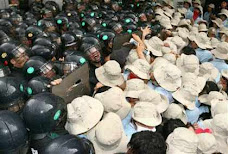

Olympic torch reaches Mount Everest summit
By Edward Wong
Thursday, May 8, 2008
BEIJING: A team of climbers trudged through snow and ice to carry the Olympic torch to the summit of Mount Everest on Thursday, fulfilling a long-held goal of the Chinese government to have the Olympic flame lighted on top of the highest mountain in the world.
But overseas groups opposed to Chinese rule in Tibet quickly denounced the event, saying the Chinese government was simply using the torch relay to bolster claims of sovereignty over what should be an independent country.
The ascent of the north face of Mount Everest, whose icy summit is at 8,850 meters, or about 29,000 feet, was the most ambitious leg of what is expected to be the longest Olympic torch relay in history. The torch that climbers carried to the top at 9:18 a.m. on Thursday was a side torch; the main torch is making its way through the southern province of Guangdong and will continue through every province of China before arriving in Beijing in early August.
The Chinese government has tried to maintain tight control over every aspect of the Everest climb. Officials brought a group of journalists to the base camp to help publicize the ascent while barring foreign climbing groups from any summit attempts for fear of Tibet-related protests further marring the torch relay, which has already been beset by anti-China demonstrations in foreign cities. The Nepalese government, prompted by Chinese leaders, has also kept climbing groups away from the mountain.
Mount Everest lies on the border of Nepal and the Tibet Autonomous Region.
The capital of that region, Lhasa, and other Tibetan areas in western China were shaken by anti-China protests and riots in March. The Chinese government responded with what critics have called heavy-handed suppression. That inspired Tibet supporters to protest the Chinese government in foreign cities through which the torch passed, including London, Paris and San Francisco.
The state-controlled Chinese news media have highlighted the fact that most members of the climbing team on Everest, called Qomolangma by ethnic Tibetans and Han Chinese, are Tibetans. The torch was lit at 9:12 a.m. by Norbu Zhamdu and then carried on a 30-meter relay to the peak, according to Xinhua, the state news agency. The team captain, Nyima Cering, was the third torch bearer and shouted the 2008 Olympic slogan, "One world, one dream."
Photos showed a team of climbers bundled in red down jackets and wearing oxygen masks standing next to Tibetan prayer flags atop the windy, snowbound summit. The climbers held up the Chinese national flag and two white flags with the Olympic rings. The summit attempt had been repeatedly delayed by bad weather that forced the team to sit for days at high-elevation camps.
The completion of the Everest climb came four days after brief talks in the Chinese city of Shenzhen between Chinese officials and two envoys of the Dalai Lama, the spiritual leader of the Tibetans. The two sides agreed to another round of talks, though no date has been scheduled.
On Thursday, Reuters reported that an envoy of the Dalai Lama, Lodi Gyari, said in a statement that "there were strong and divergent views on the nature as well as the causes of the recent tragic events in Tibet."
An organizer of the Free Tibet Campaign, based in London, said on Thursday that bringing the torch up Mount Everest was a political stunt on the part of the Chinese government.
"Given we've seen the protests in Tibet over the last few months demonstrating the Tibetans' emphatic rejection of Chinese rule over Tibet, what the ascent of the torch on the Tibetan side of Everest means is that China is trying to assert its baseless claim of sovereignty over Tibet," the organizer, Matt Whitticase, said by telephone.
The Free Tibet Campaign and other pro-Tibet groups have urged the International Olympic Committee and sponsors of the torch relay to prevent China from carrying the torch through Tibet. The main torch is scheduled to pass through Lhasa and other Tibetan areas later this summer.
Also on Thursday, an advocate for human rights in China, John Kamm, publicly urged the Chinese government to grant an "Olympic pardon" to long-serving prisoners who are nearing the end of their sentences. Kamm said in a statement that no Olympic host had ever made such a move, and that China now faced a "historic opportunity."
"A pardon for those who have served the great bulk of their sentences would result in the release of the remaining prisoners from June 1989 - symbolically putting that tragedy behind the Chinese people," Kamm said, referring to the brutal government suppression of the Tiananmen Square protests.
Kamm, the head of the Dui Hua Foundation, based in San Francisco, said an Olympic pardon would also free those prisoners "still serving sentences for counterrevolution, a crime removed from China's criminal law in 1997."
Copyright © 2008 The International Herald Tribune http://www.iht.com/































No hay comentarios:
Publicar un comentario